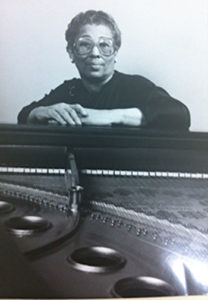
Dr. Geneva Southall
Geneva Handy Southall was born on this date in 1925. She was a Black musician, educator, activist, and author.
She was born in New Orleans, LA, and was one of four children born to the Reverend and Mrs. W.T. Handy, Sr. She attended segregated schools and overcame a speaking impediment while young. All children in the Handy family were expected to learn piano and string instruments. Her mother was her first piano teacher. In 1941, Southall entered Dillard University, where Carol Blanton taught her.
She was active with the school newspaper, theater guild, and community through Delta Sigma Theta Sorority. She also accompanied the school choir and the chapel services on piano. She taught (among others) in her private piano teaching Ellis Marsalis Jr.
After graduation, she moved to Los Angeles and, in 1944, married Patrick Omille Rhone; the couple had one daughter, Patricia (Tisch) Camille. In California, she continued school and taught piano at the Gray Conservatory of Music. In 1953, her husband died, and she began to pursue higher education. This came from graduate work at the American Conservatory of Music in Chicago. Southall received her Master of Music in piano and theory three years later. Over the next ten years, Dr. Southall performed nationally and internationally while presenting papers at major music conferences. She worked with many Historically Black Colleges and Universities in America while raising her daughter.
She also began involvement in American Civil Rights through the NAACP. In 1966, Dr. Southall became the first woman to receive a Ph.D. in piano performance and music literature at the University of Iowa.
During the 1960s, Southall and her daughter, Tisch, were active in the community while she was a South Carolina State University professor at Orangeburg. Southall was a plaintiff in a school desegregation suit and a consistent picketer of government agencies and businesses over racial equality issues. "She was politically minded," her daughter said. "She was in prison twice. I was in jail seven times."
In 1970, Southall joined the University of Minnesota’s Afro-American Studies Department as a professor of Black music culture courses. She also became a member of the Graduate Faculty in its Department of Music. She was named department chairwoman in 1974. While in Minneapolis, she was one of the organizers of the Black Music Educators of the Twin Cities, promoting Black musicians' work. She headed the University of Minnesota's African American Faculty Association and received numerous teaching awards, including Outstanding Educator of America in 1973.
Southall pushed for increased racial diversity at the University of Minnesota and, in 1988, received an All-University Diversity Award. 1993, the African American and African Studies Department named its library after Southall.
Other global recognition includes International Who’s Who of Music, International Who’s Who of Intellectuals, Dictionary of International Biography, Who’s Who among Black Americans, Who’s Who of American Women, Who’s Who in American Music, Eileen Southern’s Dictionary of Afro-American and African Musicians, National Woman of the Year, Black Music Hall of Fame, and Dillard University’s Distinguished Alumni Award.
She retired in 1992. She was a music scholar and wrote three books on Thomas "Blind Tom" Wiggins, the famed slave pianist and composer of the 1800s. She spent more than 30 years researching Blind Tom's life and music and made his first recording. She was inducted into the Black Musicians Hall of Fame in 1988 and was a former National Association of Negro Musicians board member.
Professor Emeritus Geneva Southall died of complications from several strokes on January 2, 2004, in Iowa City, Iowa. At the time, she was the grandmother of four children and two great-grandmothers. Her ashes are scattered at Dillard University.
Iowa Women's Archives
100 Main Library
University of Iowa Libraries
Iowa City, Iowa 52242
Phone: 319-335-5068